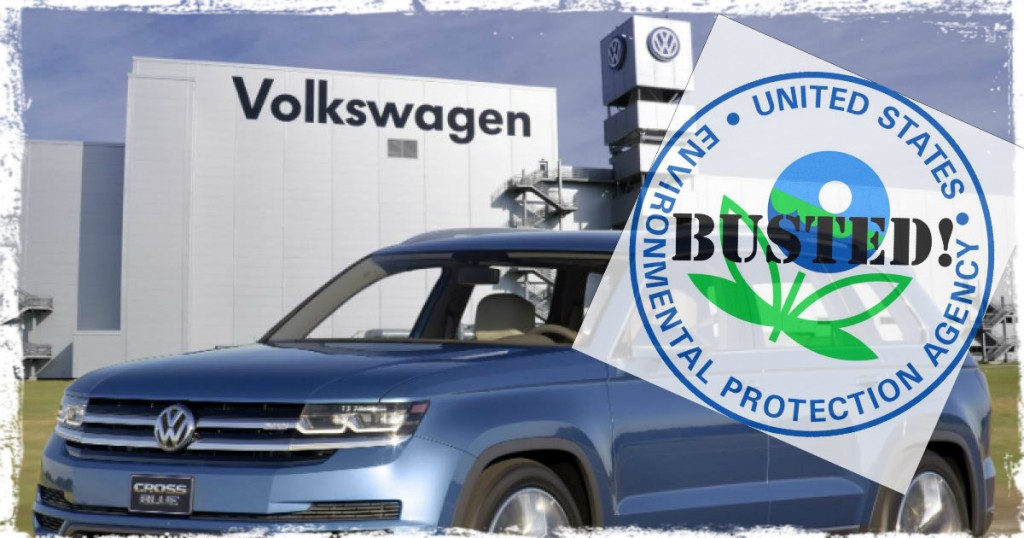
Carmaker allegedly used software that circumvents emissions testing for certain air pollutants
Washington – Today, EPA is issuing a notice of violation (NOV) of the Clean Air Act (CAA) to Volkswagen AG, Audi AG, and Volkswagen Group of America, Inc. (collectively referred to as Volkswagen). The NOV alleges that four-cylinder Volkswagen and Audi diesel cars from model years 2009-2015 include software that circumvents EPA emissions standards for certain air pollutants. California is separately issuing an In-Use Compliance letter to Volkswagen, and EPA and the California Air Resources Board (CARB) have both initiated investigations based on Volkswagen’s alleged actions.
“Using a defeat device in cars to evade clean air standards is illegal and a threat to public health,” said Cynthia Giles, Assistant Administrator for the Office of Enforcement and Compliance Assurance. “Working closely with the California Air Resources Board, EPA is committed to making sure that all automakers play by the same rules. EPA will continue to investigate these very serious matters.”
“Working with US EPA we are taking this important step to protect public health thanks to the dogged investigations by our laboratory scientists and staff,” said Air Resources Board Executive Officer Richard Corey. “Our goal now is to ensure that the affected cars are brought into compliance, to dig more deeply into the extent and implications of Volkswagen’s efforts to cheat on clean air rules, and to take appropriate further action.”
As described in the NOV, a sophisticated software algorithm on certain Volkswagen vehicles detects when the car is undergoing official emissions testing, and turns full emissions controls on only during the test. The effectiveness of these vehicles’ pollution emissions control devices is greatly reduced during all normal driving situations. This results in cars that meet emissions standards in the laboratory or testing station, but during normal operation, emit nitrogen oxides, or NOx, at up to 40 times the standard. The software produced by Volkswagen is a “defeat device,” as defined by the Clean Air Act.
The Clean Air Act requires vehicle manufacturers to certify to EPA that their products will meet applicable federal emission standards to control air pollution, and every vehicle sold in the U.S. must be covered by an EPA-issued certificate of conformity. Motor vehicles equipped with defeat devices, which reduce the effectiveness of the emission control system during normal driving conditions, cannot be certified. By making and selling vehicles with defeat devices that allowed for higher levels of air emissions than were certified to EPA, Volkswagen violated two important provisions of the Clean Air Act.
EPA and CARB uncovered the defeat device software after independent analysis by researchers at West Virginia University, working with the International Council on Clean Transportation, a non-governmental organization, raised questions about emissions levels, and the agencies began further investigations into the issue. In September, after EPA and CARB demanded an explanation for the identified emission problems, Volkswagen admitted that the cars contained defeat devices.
NOx pollution contributes to nitrogen dioxide, ground-level ozone, and fine particulate matter. Exposure to these pollutants has been linked with a range of serious health effects, including increased asthma attacks and other respiratory illnesses that can be serious enough to send people to the hospital. Exposure to ozone and particulate matter have also been associated with premature death due to respiratory-related or cardiovascular-related effects. Children, the elderly, and people with pre-existing respiratory disease are particularly at risk for health effects of these pollutants.
VW may be liable for civil penalties and injunctive relief for the violations alleged in the NOV.
The allegations cover roughly 482,000 diesel passenger cars sold in the United States since 2008.
Affected diesel models include:
• Jetta (Model Years 2009 – 2015)
• Beetle (Model Years 2009 – 2015)
• Audi A3 (Model Years 2009 – 2015)
• Golf (Model Years 2009 – 2015)
• Passat (Model Years 2014-2015)
It is incumbent upon Volkswagen to initiate the process that will fix the cars’ emissions systems. Car owners should know that although these vehicles have emissions exceeding standards, these violations do not present a safety hazard and the cars remain legal to drive and resell. Owners of cars of these models and years do not need to take any action at this time.
More information on EPA’s NOV: www3.epa.gov/otaq/cert/
More information on CARB’s In-Use Compliance Letter: http://www.arb.ca.gov/newsrel/



